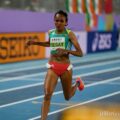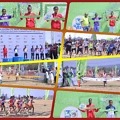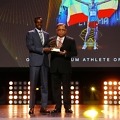Kenya’s Julius Yego broke his own African record with a world-leading 92.72 metres to become the first Kenyan field athlete to win a medal at the World Championships on the fifth day of the 2015 IAAF World Championships in Beijing, China.
Yego, who is sometimes referred to as the ‘Youtube Man’ after learning his craft from watching the Javelin videos on the social media site, already has the pedigree coming into the championships as the world leader with his 91.39m African record, set in Birmingham in June 2015.
At the last World championships in Moscow 2013, the 26-year-old held the bronze medal spot with an 85.40m Kenyan record until the last round, but was pushed into fourth place – out of the podium – in the final round by Russia’s Dmitri Tarabin on that occasion.
This time around, Yego started with a foul and a credible 82.42m throw, but on the third attempt the spear flew well beyond the 90-metre line into a territory only two other javelin throwers have ever been before.
His 92.72m throw made him the third-longest thrower ever with the current implement, and the world’s best Javelin throw in 14 years.
Julius Yego's not only became the first Kenyan medallist and winner in the field events at the World Championships, but also only the second African winner in the history of the Javelin event, following South Africa’s Marius Corbett in Athens in 1997.
In second place, Ihab Abdelrahman El Sayed grabbed a historic silver medal Egypt with a second round throw of 88.99m. His country’s best achievement ever at the World Championships and the second-best throw of his career – just 28 centimetres off his national record set in Shanghai in 2014.
Competing at his sixth consecutive World Championships, Tero Pitkamaki of Finland took the bronze medal and so now has one of each colour following gold in 2007 and silver in 2013.
“After the second throw I knew the technique was not right,” Yego said at the post-race press conference.
“My coach Petteri (Piironen) told me what I was doing wrong. Looking at the competition I knew I needed a big throw to stay in top eight. I reckoned that if I can just throw 90m, I would win it.”
“Most of the field had already thrown over 87m so I knew I needed a special one, I needed over 90m. Then I did it. World champion! It is unbelievable. I cant even express it. Being the world champion,” he added.
Van Niekerk’s stunning African record
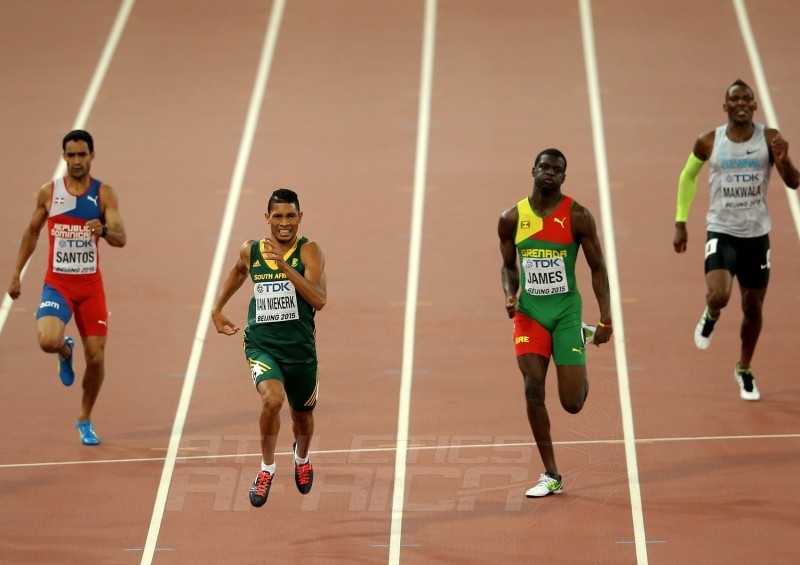
Wayde van Niekerk of South Africa winning the men’s 400m on day 5 at the 2015 IAAF World Championships in Beijing, China / Photo credits: Getty Images for the IAAF
South Africa’s Wayde van Niekerk reclaimed the African 400m record he held for 24 hours in July, after beating Kirani James in the Paris IAAF Diamond League meeting, from Botswana’s Isaac Makwala, who ran 43.72 a day later.
Van Niekerk clocked a stunning lifetime best time of 43.48 secs to win the gold medal at Beijing 2015, shaving nearly half a second from his previous PB and taking his country’s first global victory at 400m since Bevil Rudd at the Antwerp 1920 Olympic Games.
His efforts and subsequent exhaustion sent him straight to the hospital on a stretcher, but he has already made history as the second-fastest 400m runner in World Championships history and the fourth-fastest all time.
Wayde Van Niekerk succeeded in winning a global 400m title for Africa where Ivory Coast’s Gabriel Tiacoh (silver medal at the 1984 Olympic Games), Kenya’s Samson Kitur (bronze at the 1992 Olympics and 1993 World Championships) and Uganda’s Davis Kamoga (bronze at the 1996 Olympics and silver at the 1997 World Championships) all failed.
Defending champion LaShawn Merritt ran a personal best time of 43.65 to take the silver medal and Olympic champion Kirani James crossed the line in 43.78 for bronze – the first 400m with three athletes running sub-44.
London 2012 Olympics silver medallist Luguelín Miguel Santos Aquino ran a Dominican record of 44.11 to take the fourth spot while the reigning African champion Isaac Makwala finished fifth in 44.63.
Queen Kiyeng wears Steeple crown
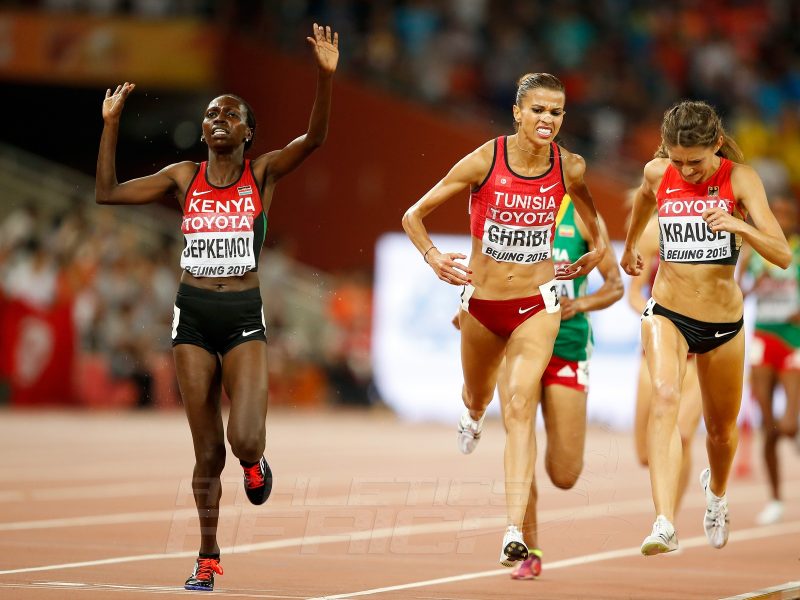
Habiba Ghribi of Tunisia and Kenyan Hyvin Kiyeng on day 5 at the 2015 IAAF World Championships in Beijing, China / Photo credits: Getty Images for the IAAF
Kenyan Hyvin Kiyeng Jepkemoi won the women’s 3000m steeplechase final in first major championships medal for the 23-year-old Kenyan, who was after her sixth place finish in Moscow in 2013.
2011 silver medallist Habiba Ghribi from Tunisia clocked 9:19.24 to take her third global championships silver medal while Germany’s Gesa Felicitas Krause took the bronze medal in 9:19.25, a personal best.
The 2013 bronze medallist Sofia Assefa from Ethiopia was fourth in a season’s best of 9:20.01, USA’s Emma Coburn was fifth in 9:21.78, six places better than she managed in 2011.
Ethiopia’s Hiwot Ayalew was sixth in 9:24.27, two places lower than in Moscow, and another Kenyan Virginia Nyambura was seventh in 9:26.21, a solid performance at her first major championships.
“This victory will change my life for sure. My first big achievement, very unexpected,” said 23-year-old Kenyan who is coached by Patrick Sang after the race.
“I have been working on my technique at the water jump and it worked today. It was a very tactical and slow race but I liked the fast finish,” Kiyeng added.
Meet The Authors
Yomog Meje is a former Nigerian junior athlete and the Associate editor at Athletics Africa.



